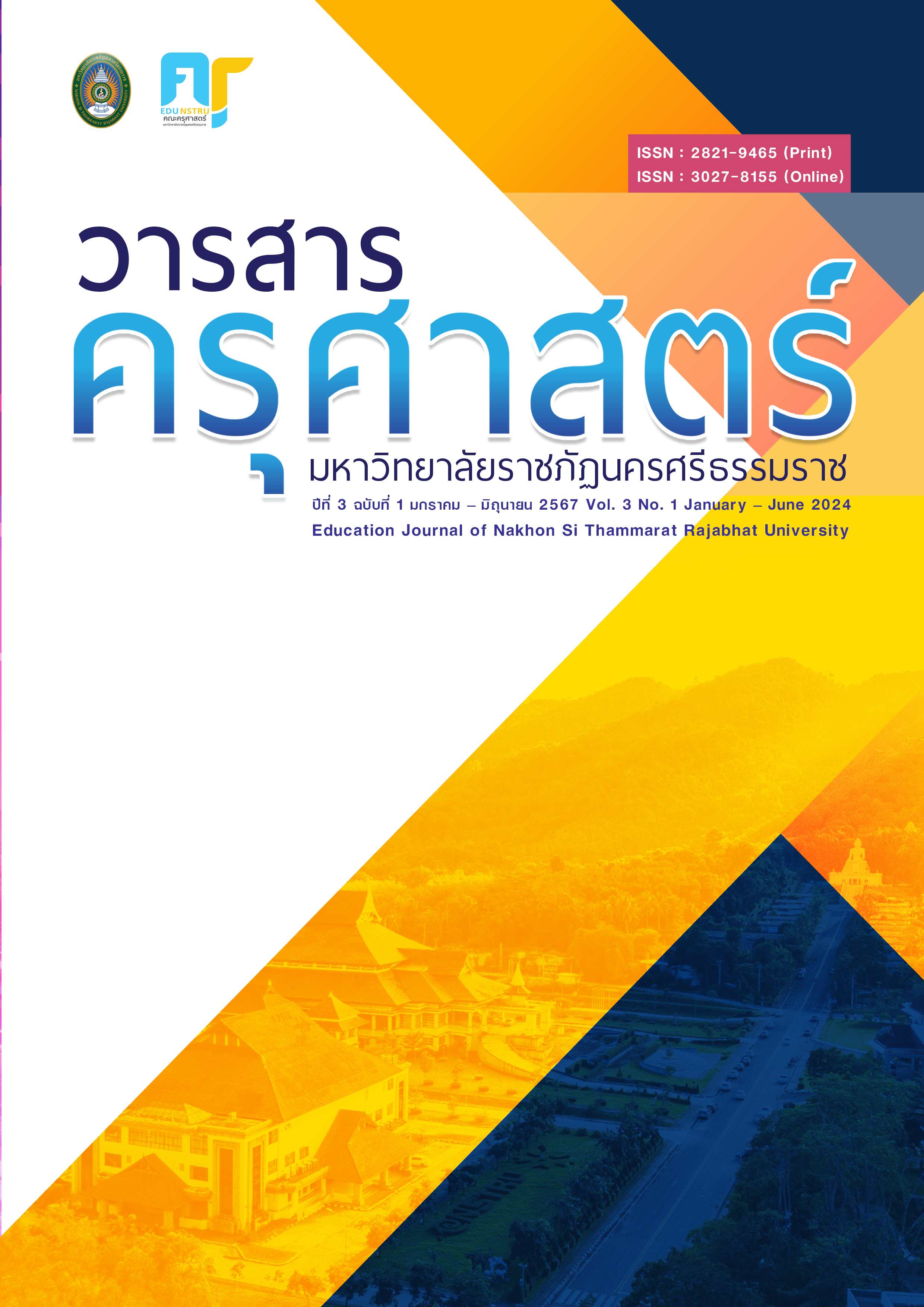รูปแบบการบริหารสถานศึกษาพอเพียงสู่ศูนย์การเรียนรู้ตามหลักปรัชญาของเศรษฐกิจพอเพียง ด้านการศึกษาของสถานศึกษา สังกัดสำนักงานเขตพื้นที่การศึกษาประถมศึกษาตรัง เขต 2
Main Article Content
บทคัดย่อ
การวิจัยนี้มีวัตถุประสงค์เพื่อ 1) ศึกษาสภาพปัจจุบันและองค์ประกอบของการบริหารสถานศึกษาพอเพียงสังกัดสำนักงานเขตพื้นที่การศึกษาประถมศึกษาตรังเขต 2 2) สร้างและพัฒนารูปแบบการบริหารสถานศึกษาพอเพียงสู่ศูนย์การเรียนรู้ตามหลักปรัชญาของเศรษฐกิจพอเพียงด้านการศึกษา และ 3) ประเมินรูปแบบการบริหารสถานศึกษาพอเพียงสู่ศูนย์การเรียนรู้ตามหลักปรัชญาของเศรษฐกิจพอเพียงด้านการศึกษา เป็นการวิจัยแบบผสมผสาน ได้แก่ 1) การวิจัยเชิงปริมาณ ใช้แบบสอบถามเก็บข้อมูลจากสถานศึกษา 88 แห่ง สุ่มตัวอย่างแบบหลายขั้นตอน จำนวน 264 คน ใช้สถิติ ร้อยละ ค่าเฉลี่ย ส่วนเบี่ยงเบนมาตรฐาน 2) การวิจัยเชิงคุณภาพ (1) สร้างและพัฒนารูปแบบ เครื่องมือที่ใช้เป็นแบบตรวจสอบรูปแบบ (2) ประเมินรูปแบบการบริหารสถานศึกษาพอเพียงสู่ศูนย์การเรียนรู้ตามหลักปรัชญาของเศรษฐกิจพอเพียงด้านการศึกษา เครื่องมือที่ใช้เป็นแบบประเมินรูปแบบ ด้านความถูกต้อง เหมาะสม ความเป็นไปได้ ความเป็นประโยชน์
ผลการวิจัยพบว่า 1) สภาพปัจจุบันของการบริหารสถานศึกษาพอเพียงอยู่ในระดับมากที่สุด (=4.22, S.D.=0.75) และการปฏิบัติงานสู่ศูนย์การเรียนรู้ตามหลักปรัชญาของเศรษฐกิจพอเพียงอยู่ในระดับมากที่สุด (
=4.23, S.D.=0.69) องค์ประกอบของรูปแบบ (1) องค์ประกอบเสริมสร้างความเป็นเลิศ 7 องค์ประกอบหลัก และ 8 องค์ประกอบสนับสนุน (2) องค์ประกอบยกระดับพัฒนา 6 องค์ประกอบหลัก และ 9 องค์ประกอบสนับสนุน 2) รูปแบบการบริหารสถานศึกษาพอเพียงสู่ศูนย์การเรียนรู้ ประกอบด้วย 4 ส่วน (1) ส่วนนำ (ชื่อรูปแบบ แนวคิด/หลักการ จุดมุ่งหมาย กลยุทธ์/ แนวทางการพัฒนา เป้าหมาย) (2)ตัวแบบ/ลักษณะรูปแบบ (3) ขั้นตอนการนำรูปแบบไปใช้ (4) ปัจจัย/เงื่อนไขความสำเร็จ และ 3) ผลการประเมินรูปแบบ มีความถูกต้อง คิดเป็นร้อยละ 100 ความเหมาะสม ความเป็นไปได้ ความเป็นประโยชน์ คิดเป็นร้อยละ 97.22
Article Details

อนุญาตภายใต้เงื่อนไข Creative Commons Attribution-NonCommercial-NoDerivatives 4.0 International License.
บทความที่ได้รับการตีพิมพ์เป็นลิขสิทธิ์ของวารสารครุศาตร์ มหาวิทยาลัยราชภัฏนครศรีธรรมราช
ข้อความที่ปรากฏในบทความแต่ละเรื่องในวารสารวิชาการเล่มนี้เป็นความคิดเห็นส่วนตัวของผู้เขียนแต่ละท่านไม่เกี่ยวข้องกับวารสารครุศาสตร์ มหาวิทยาลัยราชภัฏนครศรีธรรมราช
เอกสารอ้างอิง
Autchobkarn, S., Sawpayon, S., & Songkitipisal, M. (2023). An Administration Model for Basic Education Institutions under the Office of the Basic Education Commission Affecting Competency Development of Learners in the Era of Thailand 4.0. Journal of MCU Peace Studies, 11(6), 2179–2194. Retrieved from https://so03.tci-thaijo.org/index.php/journal-peace/article/view/263307 (in Thai)
Cronbach, L.J. (1984). Essential of psychology testing. New York: Harper.
Deemulphan,T. (2022). Administration of educational institutions based on the Sufficiency EconomyPhilosophy in the Wang Sita Education Network under the Saraburi Primary Educational Service Area Office 2 (Independent Study for the Master of Education, Department of Educational Administration, Graduate School, Silpakorn University). Nakhon Pathom: Silpakorn. (in Thai)
Homchaen, N., Boonpu, S., & Chaisuk, P. (2023). The Development of a Learning Center Model According to the Philosophy of Sufficiency Economy in Terms of Buddhist Education of Elementary Schools Under the Office of Pathum Thani Primary Educational Service Area, Region 1. Journal of Educational Management and Research Innovation, 5(3), 731–746. Retrieved from https://so02.tci-thaijo.org/index.php/jemri/article/view/261795 (in Thai)
Ivancevich, J.H., et al. (1989). Management: Principles and Function (4th Ed.). Boston: Ma.:Richard D. rain.
Keeves, J.P. (1994). Models and Model building. The International Encyclopedia of Education,7, 560-569.
Khammanee, T. (2010). Teaching and learning models: Various options (6th ed.). Bangkok: Chulalongkorn University Press. (in Thai)
Krejcie, R.V., & Morgan, D.W. (1970). Determining Sample Size for Research Activities. Educational and Psychological Measurement, 30, 607-610. https://doi.org/10.1177/001316447003000308
Likert, R. (1967) .The HumanOrganization:Its Management and Values.New York: McGraw Hill.
Ministry of Education. (2012). Announcement of the Ministry of Education on guidelines for developing and evaluating Sufficiency Economy Learning Centers in education. Bangkok: Sufficiency Economy Driving Center. (in Thai)
Office of the Permanent Secretary for the Ministry of Interior. (2022). Handbook for driving the application of the Sufficiency Economy Philosophy into practice as a way of life. Bangkok: Ministry of Interior. (in Thai)
Phumkerd, N., Tawee, S., & Suntawan, T. (2021). Sufficiency School Administration Model for a Learning Center Basing on the Philosophical Principles of Sufficiency Economy in Opportunity Extension Schools. Dhammathas Academic Journal, 21(1), 103–118. Retrieved from https://so06.tci-thaijo.org/index.php/dhammathas/article/view/168682 (in Thai)
Saiyot, L., & Saiyot, A. (2000). Educational Research Techniques (3rd. ed.). Bangkok: Suwiriyasarn.
Saraburi Primary Educational Service Area Office 2. (2021). Annual Performance Report for Fiscal Year 2020.Saraburi: Saraburi Primary Educational Service Area Office 2. (in Thai)
Stufflebeam, D.L. (1981). Evaluation Models. San Francisco: Jossey-Bass.
Trang Primary Educational Service Area Office 2. (2023). Information on driving the Sufficiency Economy Philosophy in education. Trang: Trang Primary Educational Service Area Office 2. (in Thai)


